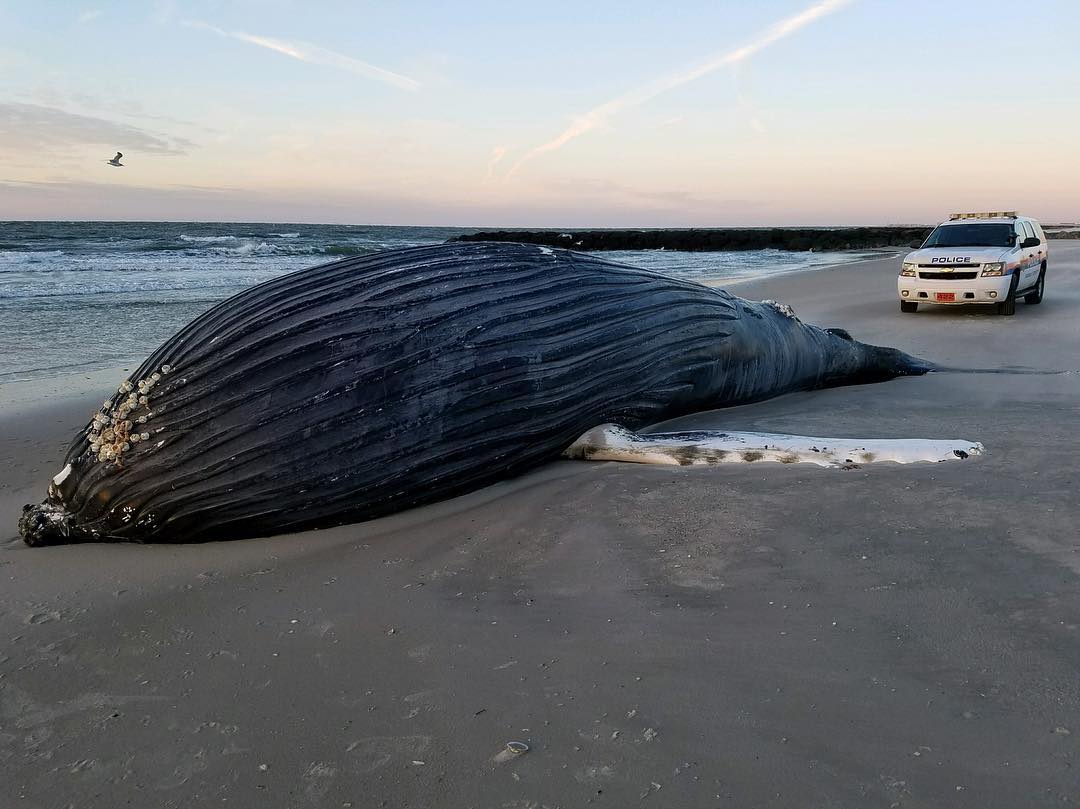AMCS Performs Necropsy on Stranded Humpback Whale in Atlantic Beach
Even during the holidays, Atlantic Marine Conservation Society is prepared to be in the field promoting conservation of the marine environment through action. As the lead large whale response organization in New York State, our nonprofit organization responds to calls of deceased marine mammals and sea turtles 24-7. The day after Christmas is no exception.
Nassau Police Photo of the Deceased Humpback Whale in Atlantic Beach
On Tuesday, December 26, 2017 we prepared to respond to two strandings on opposite ends of Long Island. The first was for a deceased common dolphin that washed ashore in Montauk, and the second was for a deceased humpback whale that washed ashore in Atlantic Beach. While part of the necropsy team conducted a necropsy on the common dolphin with National Park Services that day, the rest of the team began formulating a response plan for the 33-foot humpback whale.
Whale necropsies take several hours, and with considerations for daylight and the tide in mind, the response was scheduled to take place the following day on Wednesday, December 27, 2017. Atlantic Beach in the Town of Hempstead is a popular area, and news of the whale spread quickly. AMCS worked with the Town of Hempstead's Department of Conservation and Waterways, Bay Constables, and Department of Sanitation, Marine Mammals of Maine, Mystic Aquarium, Stony Brook School of Atmospheric and Marine Sciences, NOAA Fisheries, NYS Department of Environmental Conservation, and the Long Beach Department of Public Works to secure the whale, set up a work site, and follow safety procedures on day with temperatures below freezing to perform the necropsy. The team was joined by media and members of the community interested to learn more of what was going on.
The necropsy took several hours to complete, and samples were sent to a pathologist to help determine a cause of death. Following the necropsy, the whale was buried on the beach. Members of the community expressed interest and concern in this disposal method, and AMCS biologists spoke to individuals about why this method was chosen. Education is an important aspect of our work, and we greatly appreciate the support of the community in our efforts.
Below is a joint statement from Atlantic Marine Conservation Society and National Oceanic and Atmospheric Administration (NOAA) Fisheries about the burial:
Burial on the beach is the most natural way to dispose of deceased whales, and is the primary disposal option for large whale carcasses around the country. This has been an effective means of disposal for more than 40 years, and the whale stays contained on the beach. Animals are buried high on the beach near the base of dunes to mitigate concerns of erosion. There have been a number of studies that assess leachate from disposal sites, however the primary focus has been contaminates and other disease agents. Leachate from a burial site is extremely slow and likely flows down into bottom sediment. Burial, similar to composting, aids in breaking down biological material faster and therefore remains to be a viable option for large whale carcass disposal.
There have never been any issues with oil/blood leaching from a burial site into the water that would attract sharks. In the event blood or oil is leached, it would be slow and the dilution factor would be so high it would be highly unlikely to be detectable by sharks. The concern with spreading disease comes from the public touching the animal. Once the animal is necropsied and the animal is buried, the risk of disease transmission is mitigated. Being made into smaller pieces after the necropsy also aids in its decomposition.
It is illegal for people to dig up the whale, or keep any pieces including bone. Marine mammals are federally protected, and only authorized organizations may respond to these animals. NOAA fully supports the ongoing efforts by AMCS to respond to large whale stranding events and to use burial as a disposal option to maintain public health and safety.
As a nonprofit organization, we truly appreciate all of the organizations involved that were instrumental in these efforts. We ask that the public help by reporting strandings to the NYS Stranding Hotline by calling 631.369.9829.
HELP SUPPORT THE EFFORTS OF
ATLANTIC MARINE CONSERVATION SOCIETY
DONATE HERE
Read stories in the news by clicking the name of the publication below:
Fox
Long Island Herald
News 12
Newsday
New York Post
Patch
Pix 11
Southampton Press

